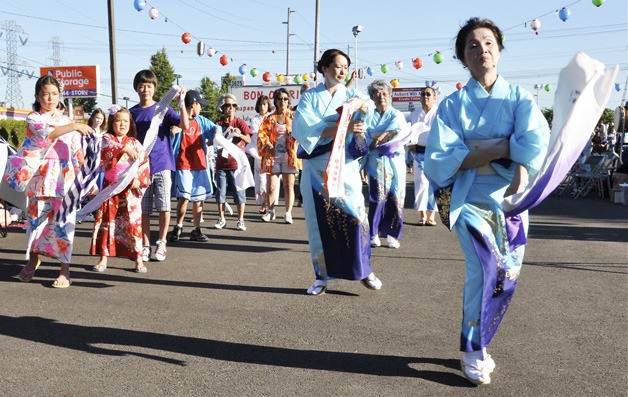Throughout the sizzling afternoon, music filled the air and drums banged out a mesmerizing beat – boom boom boom, whack! boom-boom, boom-boom, whack!
Dancers young and old in richly colored kimonos, yukatas and happi coats followed the delight of their feet under the cloudless skies and circled the parking lot turned dancing grounds, bodies swaying, arms sweeping out graceful arcs.
More than 1,000 people showed up to celebrate the Bon Odori Festival last Saturday at the White River Buddhist Temple on Auburn Way North. They danced, watched the children’s lantern parade, took in the Seattle Matsuri Taiko drum performance, sampled food and guzzled all the cool drinks they could find to beat the fierce heat.
Members of the White River sangha or congregation explained why the O-Bon dance – a time for Buddhists to reflect on the dedicated lives of departed ancestors who made the lives of living people possible – is called the Dance of Joy.
“It’s a celebration of all the good things in life,” said Kaki Kesterson, a member of the White River Buddhist Temple. “Buddhist holidays don’t tend to be centered on unhappy events, and this is the granddaddy of the happy events.”
A Seattle resident who offered only his first name, Guy, said he makes a point of visiting all the Bon Odori festivals in Olympia, Seattle, Tacoma and Auburn. But the celebration in Auburn means something special to him.
“I was married at this temple, and my wife and I have been coming here for years and years,” said Guy, fresh from a dance and looking cool in his blue and white kimono. “It’s a family reunion, and we get to see people we only see once in a season, and this is the season.
“Great food, wonderful people, great atmosphere,” Guy added, looking around. “It’s a very friendly place. I dance every dance if I can. But you don’t have to dance, nobody’s going to give you a ticket.”
O-Bon is the most popular holiday in the Mahayana Buddhist tradition. According to the Jodo Shinsu tradition, O-Bon is called “Kangi-e” or “a gathering of joy in gratitude.
Bon Odori has existed in Japan for more than 500 years.
According to Buddhist teachings, Mokuren, a disciple of the Buddha, long ago beheld a vision of his dead mother in the realm of hungry ghosts, indulging in her own selfishness. Troubled, he approached the Buddha and asked how he could release her. The Buddha said: “Provide a big feast for the past seven generations of dead.”
Mokuren did this and gained his mother’s release. He started to see the true nature of her past unselfishness and all the sacrifices that she had made for him, and he danced with joy. From this dance of joy comes Bon Odori, or “Bon Dance.”



